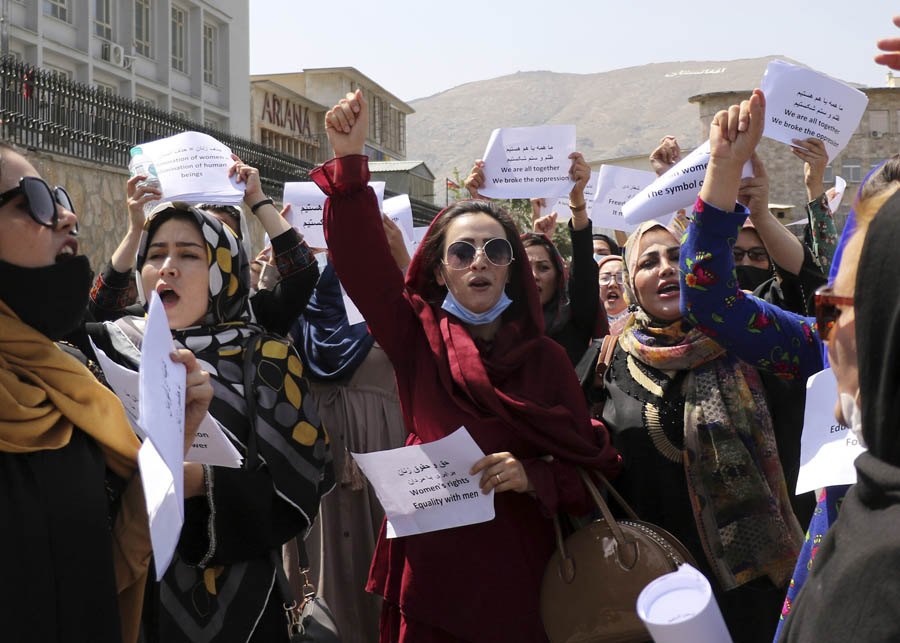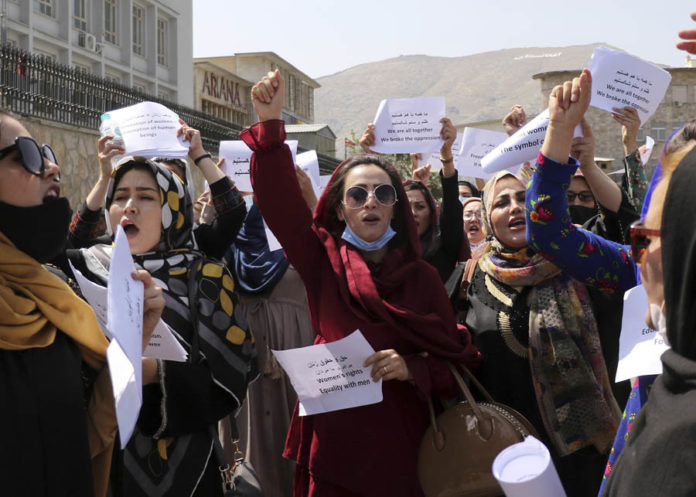Article from militaant.com
After the integration of the Taliban terrorist group into Afghanistan’s deformed capitalist system by imperialism, the most formal freedoms and democratic rights of all the oppressed layers were trampled on. The masses, who were not too familiar with protests and strikes, entered a new stage of class exploitation. This means the exploitation of workers and toilers and their suppression by the most vicious scum of capitalism that is dependent on imperialism: the Taliban.

The Afghan masses – who over many years have been passive – or have been forced into passivity – in determining their own fate, have become accustomed to this inactivity. Many among the oppressed layers are waiting for a saviour to come along and donate ‘Shelter, clothing, food’ to them (the People’s Party’s slogan) – but without the freedom to determine their own political fate. In effect, this means agreeing to a series of reforms that will keep the oppressed in the most passive position possible.
In contrast, the so-called ‘liberals’ are chanting the not-so-progressive ‘Bread, work, freedom, political participation’ slogan. Of course, this slogan may appear progressive but its non-progressive essence is easily recognisable when its liberal outlook is considered.
When ‘Bread and work’ depend on each other, in a liberal sense, the bread is actually created by work that is based on the exploitation of labourers by bosses or the ruling class. Bread that is linked to labour that is in essence imprisoned and shackled by capital. This labour is actually worth more than the bread that the workers receive from the capitalists! Labour that creates surplus value two or three times greater than the workers’ wages: surplus value that employers and the government steal. On the other hand, their concept of ‘freedom’ merely depends on the freedom of expression and opinion, and goes no further than that. Their concept of ‘political participation’ is limited to the right to elect a new ‘Master’, ‘Commander’ or ‘Head of State’.
Now, we must consider what Marxists mean by the slogan ‘Bread, work, freedom’. What other terms have to be added to it?
We demand the ‘bread’ that is the real product of our labour. We demand a wage that is no less than the value of eight hours of our labour! We do not want the surplus value produced by our work to be pocketed by employers and the governments in the form of profit. We want ‘work’ that has been freed from the chains of profit and capital. We want jobs that will allow us to continue living a dignified human life. Only through the emancipation of labour from the shackles of capital can the concept of complete liberation of humanity be fully realised.
We demand all the freedoms and democratic rights of humanity. But in addition to ‘Bread, work, freedom’, ‘Administration by workers’ councils’ is needed as its complement. We do not want to be constrained by the liberal slogan of ‘political participation’ and become merely puppets in the hands of imperialism’s mad dogs. We do not want our political involvement to be limited just to the right of electing the head of state or other ceremonial positions. We want a government founded on the principle of public participation of all the people in the decision-making processes: in determining their destinies, in setting tasks; in determining the way power is exercised. This partnership must be fully democratic: from below. We want the production and distribution of goods and services, banks and capital, administrative and military institutions, all of them, to come under the democratic control of workers’ and poor wage earners’ councils. So that the aim of production and technology is not to accumulate wealth and profit for a minority, but to resolve the hardships endured by the total majority of society. We insist on the rule of ‘council administration’ that can abolish the exploitation of any human being by another and can transform private property, which is based on the labour and sweat of the working and toiling classes. So that the social system will no longer be a burden that the masses have to bear but one that serves them.
We can only agree with the ‘Bread, work, freedom’ slogan as long as it does not stay in a purely economist form, operating within the bourgeois-democratic framework. We believe that even this minimum demand cannot be realised within the narrow framework of the capitalist system in Afghanistan, and must have the potential for going beyond this framework.
It is therefore necessary to combine this slogan with a form that can transform it into an anti-capitalist demand. ‘Administration by workers’ councils’ is a minimum that can serve this purpose. But this is not an anti-capitalist position. We must emphasise a form of ‘Administration by workers’ councils’ that can go beyond the limits of capitalism. Having a socialist perspective that goes further than a purely economist concept of ‘Bread’ means liberation from exploitation that goes further than ‘freedom’ within a capitalistic framework. At the very least it can show that those chanting the slogans do not have any illusion in the current system.
Therefore ‘Bread and work’ – on the condition that it is not constrained by exploitation – together with the freedom of expression and opinion; the right to form independent organisations and parties; the participation of workers’ councils in determining government strategies; can guarantee that no illusions are formed about the capitalist system and that those chanting the slogans are not deceived.
Afghanistan’s Revolutionary Marxists’ Tendency













